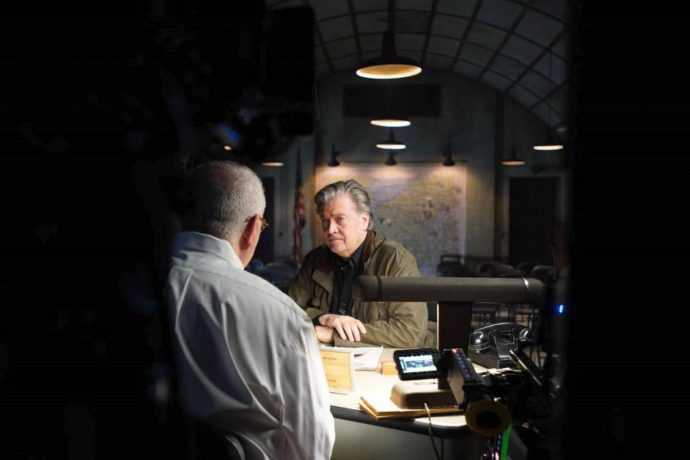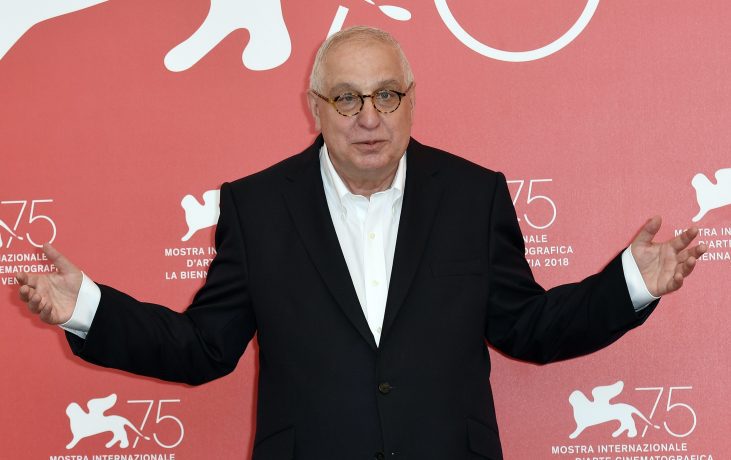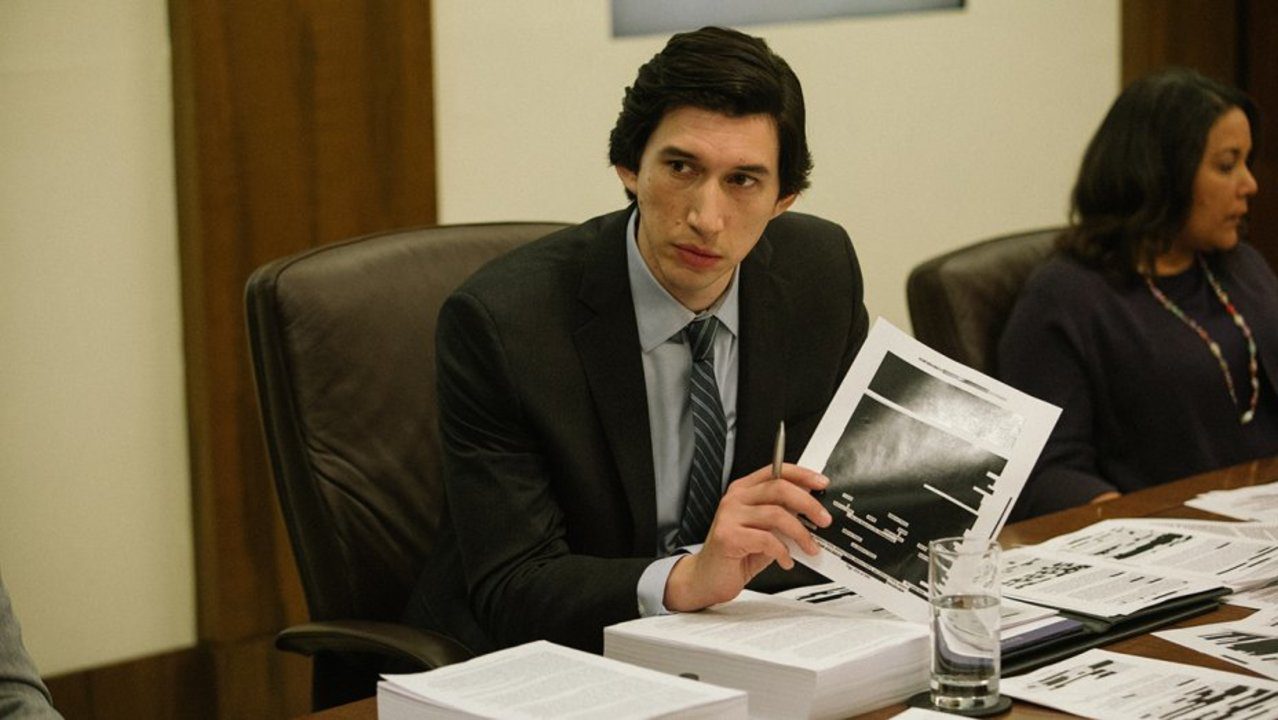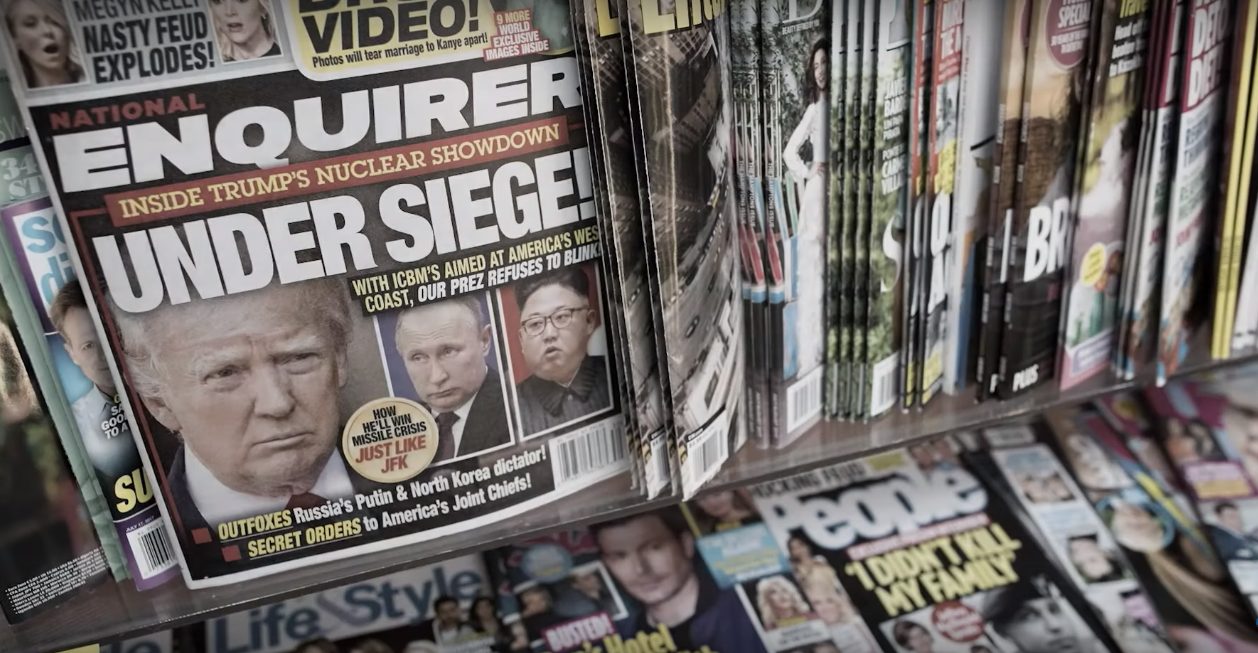'You Cannot Kill David Arquette' is a Wacky and Touching Look at the Actor’s Return to Professional Wrestling
Quick Take: Branded as the most hated man in wrestling after winning a highly controversial WCW World Heavyweight Championship in 2000, actor David Arquette attempts a rocky return to the sport that stalled his promising Hollywood career.
‘Unexpected’ is the word that comes to mind when I think about You Cannot Kill David Arquette. I didn’t expect to love this film… but I loved this film. I found it totally wacky and unexpectedly touching. I was aware of David Arquette and his famous siblings fairly early on, but my knowledge of his life and career didn’t extend past the Scream movies that I watched as a teenager and his marriage to Friends star, Courtney Cox. As an adult now, I wouldn’t have imagined I would be watching a documentary about a star from my teenage years re-launching his career in professional wrestling at age 48.
You Cannot Kill David Arquette gives us no-holds-barred, all-areas access into David Arquette’s private life during his re-entry into the wrestling world. His current wife, Christina McLarty, is a producer on the film and features prominently in it. The film also features his ex-wife Courtney Cox and their daughter, Coco, as well as his sisters Patricia and Rosanna. The women in his life discuss his wrestling aspirations with a mixture of amusement and concern. Courtney seems to think the idea is nuts; Coco expresses sheer embarrassment… I too would be mortified if my Dad dressed up in bizarre costumes and got his kicks by getting beaten up. Other characters include Arquette’s cardiologist, who (surprise, surprise) is not a big fan of the wrestling plan and tells him to stay on his blood thinners. Another scene shows him in a treatment room with his psychiatrist and his wife as he is dosed with Ketamine for his depression.
At times the film feels like an exploration of the psychology of a lost soul. “I’ve been auditioning for like 10 years without actually getting a role. So that’s like 10 years of rejection. Who does that?” says Arquette. At the age of 48, he still seems to be searching for his place and purpose. Wrestling seems to give him some sense of both belonging and escapism. “It’s a sport, no matter what anyone says, but it’s just a theatrical sport. It’s like a play on steroids.” But even in wrestling, he doesn’t fit in. In one scene, sitting alone and ignored at a wrestling conference, you feel for this once Hollywood star who’s become persona non grata.
“I hate growing up,” says Arquette at one point. There is childlike nature to him that makes the film sweetly funny, even when he’s getting his face smashed in. One moment in particular - when he is sitting on a horse, dressed in what looks like a wizard’s wrestling costume, puffing on a vape pipe -Arquette’s voice over says “I’m kind of sick of being a joke, to be honest with you. If you’re part of the joke, it’s not as painful as if you are the joke.” I get the sense David Arquette is in on this one. The whole film has a wonderful sense of performance about it, even as a documentary. Performance as an actor, performance as a wrestler, a man living in an adult world of child-like make-believe.
Distributed by Super LTD, You Cannot Kill David Arquette is available on VOD this Friday, August 28th.
'The Blech Effect' is an Intimate Documentary About a Former Millionaire’s Downfall
Quick Take: A bipolar millionaire who gambled everything for success is faced with the devastating consequences of losing it all.
David Blech’s success story sounds like the modern-day American dream. His first biotech venture investment, Genetic Systems, was sold in 1986 for $294 million. In 1989, he co-founded Icos Corporation, which received start-up funding of $33million. In 1992, Blech made the Forbes 400 list with an estimated wealth of around $300 million. Today, the total value of the biotech companies he helped create is in excess of $144 billion. Along the way, those companies have developed two major cancer drugs, a test to detect and prevent female sterility from Pelvic Inflammatory Disease, and the erectile dysfunction drug Cialis, among others. Called the “king of biotechnology,” David Blech was the industry’s number one investor for fifteen years. He even had an industry term named after him - “The Blech Effect” - meaning the incredible yield resulting from combining huge start-up investment, technology, and medical science.
But when the documentary begins, David Blech is facing the possibility of prison time after pleading guilty to two counts of securities fraud. He is dealing with the ongoing impact of living with bipolar disorder, which he believes contributed to his financial crimes and gambling addiction. The Blech family are $11 million in debt and facing eviction.
His one remaining asset - and his family’s only potential salvation - is a sizable stake in Intellect Neurosciences, a company developing a drug to treat Alzheimer’s disease. If successful, the Blech family would be saved by the return on their investment. At a minimum they would be able to pay their rent and afford the schooling required for their special-needs son; more likely they would be restored to millionaire status.
The film is straightforward in style, free from gimmicks and convoluted timelines, and artfully weaves the extreme ups and downs of Blech’s mental state with the ups and downs of his life. It is realistically bleak; David, his wife Margaret, and his son Evan are all sympathetic characters struggling through a pretty hellish situation. Regardless of the mistakes he may have made, it is touching and painful to watch David Blech confront the challenges of biology and circumstance.
For me, the film would have benefitted from a greater focus on the race to develop the Alzheimer’s drug, a subplot that could have added tonality and dynamism, and which would have been fascinating in its own right. That said, The Blech Effect is worth watching for its intensely intimate insight into the personal life of a man who gambled everything for success, and the devastating consequences of losing it all.
Distributed by Virgil Films, The Blech Effect is available to stream on VOD August 25th.
Errol Morris: "The whole country has gone batshit crazy"
“The whole country has gone batshit crazy -
And the reaction to American Dharma seems so much part of it.”
A conversation with Errol Morris.
Errol Morris’s latest documentary is a feature-length conversation with Steve Bannon, filmed on the recreated set of the 1949 movie Twelve O’Clock High, which is one of Bannon’s favorite movies. Throughout American Dharma, the interview is intercut with clips from Twelve O’Clock High, and other Bannon favorites, as well as coverage of the Trump campaign, political ads run by the campaign, and stories from the Breitbart website.
Steve Bannon is a highly polarizing figure. He is considered the mastermind behind the 2016 election of Donald Trump. He was Trump’s Chief Strategist during the first seven months of his administration. He is the former executive chairman of the far-right Breitbart News. He served on the board of Cambridge Analytica, the data-analytics firm involved in the Facebook scandal. In spite of the fact that Errol Morris has stated his objections to Bannon’s views both in the film (at one point he calls him mad), and in multiple interviews, he has still been accused of having a “bromance” with Bannon, of giving “a platform to a man charged with abetting the spread of hate.”
“I disapprove of what you say, but I will defend to the death your right to say it,” wrote Evelyn Beatrice Hall over 100 years ago. Many of the critics of American Dharma seem to believe the opposite. Much of the criticism of the film has revolved not around the film itself, but around the controversy surrounding its protagonist.
Donald Trump is President, and there is little doubt that Bannon played a major role in his election. Who he is, how and why he did it - these are crucial questions to ask about a person who has had an irrevocable and controversial impact on contemporary U.S. politics and culture.
The following has been edited for length and clarity.
I thought American Dharma is an incredibly interesting film and I really appreciated how it is very meta as a film, very self-referential.
Nice to hear.
I feel like that has not been what people have been talking about.
You would be right about that.
I worked on a film called The Final Year—
Of course.
And I noticed a similar response. I think people got lost in the politics.
Yes, but this has been unusual. And I don’t get it - when people say that this is a Bannon apology film. When the film was shown at the Venice Film Festival, one critic called it a ‘bromance’. I think it’s utterly nuts, to see this film in any way as a pro-Bannon film.
I thought the style of the film said a lot -- fictional movies inside a documentary, a documentary filmed on the set of a fictional film; a documentary subject who is arguably a character of media creation; screens within screens. I don’t understand how those elements were missed.
Most people missed everything. I think the movie is hopelessly meta. I like that. A New Yorker interviewer came a couple of weeks ago and said “You know, I have to be completely honest with you...This is your least ironic movie.” My son said to me “Well, they really know how to irritate you, don’t they?” And it’s true. Irony, for me, is why I’m even still alive. No irony, I just couldn’t bear any of it.
I watched Twelve O’Clock High for the first time shortly before I started to interview Bannon. What a weird, fucked-up movie. And what a powerful movie. What’s the message? Maximum effort. You get in that airplane and you go over Nazi Germany and you drop those bombs and if you die in the process, that’s just fine. We are all together in an effort to destroy the enemy. Okay, I’m a Jew. Am I happy that Nazi Germany was defeated? Yes. But I asked myself, could this be a movie for the Third Reich? It’s nihilistic. There is no really inherent morality other than winning and more winning. And then Bannon tells me, “First week Harvard Business School. Maximize shareholder value, kill the enemy!”
I don’t wanna be so bold as to claim this is an irony, but let’s call it a possible irony: Bannon takes a World War II movie about defeating Nazi Germany as his model for the 2016 election. Maximum effort, win at all cost. You’re on the plane or you’re off the campaign. Anything goes. Bring in the Clinton accusers now. There he is in his Quonset hut from Twelve O’Clock High. My production designer, Adam Stockhausen, did a beautiful job of recreating that Quonset hut. It’s pretty stunning and we all enjoyed, stunning as it was, burning the sucker to the ground.
Did making American Dharma make you look at the 2016 election differently?
One of the things that I learned making this movie is that the 2016 election was about sex, but not the way people thought. Wasn’t about glass ceilings. Yes, there was a misogynistic element, but it went so much further than one could ever imagine. Not that Hillary was a perfect person or perfect candidate, but the insane hatred of Hillary. Plus this perfect storm - Wiener and his dick pics, Hillary and her emails. I put that commercial in American Dharma because, it’s the most powerful political commercial I’ve ever seen, where they link the dick pics with the emails, with pervert Anthony Weiner. It was an election about who’s the bigger pervert. When Hillary Clinton in the second debate calls Trump a puppet, he comes back and says, “I’m not a puppet, you’re a puppet. Puppet. Puppet!”. “I’m not a pervert. You’re a pervert! Pervert, Pervert!”.
I’ve never seen the world crazier. Maybe I missed the Third Reich - mercifully. But the whole country has gone batshit crazy. And the reaction to American Dharma seems so much part of it. A friend of mine wanted me to write a book, correctly pointing out that the movie might be interesting, but the reaction to the movie is maybe even more interesting.
I often think that [Trump's] appeal, which of course mystifies me, is all those people who wanna say “fuck you” to their employers, to their spouses, to their children, to their communities, he’s given them permission.

What’s the most absurd question you’ve been asked about American Dharma?
Oh, that’s a competitive category. What did someone say to me this morning? “Why would you wanna make a movie about the Trump administration?” I’m not exactly sure of what you say. Maybe because, for example, I pick up the paper every morning and I read horror stories about what is going on in America.
What else?
I get out of the first screening at the Venice Film Festival, over a year ago now. The first review is from Variety, calling it a ‘bromance’. Attacking me, attacking the film, and then there were reviews that followed in a similar vein. David Remnick had disinvited, de-platformed Steve Bannon for the New Yorker Festival - I suppose telling people that it’s fine, it’s okay, see no evil, hear no evil. Let’s all stick our collective heads in a hole in the ground and pretend it isn’t there or pretend if we don’t look at it, it will go away.
Yeah. So, when people say to me, “How are you?” I always say, “Can complain.” And I like to point out that complaining is a skill that needs to be practiced constantly. So yes. I still complain, but it is better than it was a year ago. I couldn’t get a distributor. The movie was described to me as - this is the favorite word of the day - toxic! As if I were trying to poison people.
What is this film ultimately about?
My favorite theme is self-deception. Here’s another crazy thing someone said to me. “You portray him as a romantic hero.” And I said, “How’s that? Do tell.” And they said, “Well, he sees himself as a romantic hero.” And I say, “Indeed he does, but I would say that the movie leaves room for you to see that this thinking may be delusional… He sees himself as a populist.” I tell him, “It’s not populism, it’s anti-populism. You take money from the rich, from right-wing billionaires, you go to Harvard Business School, you work for Goldman-Sachs, buy and sell Hollywood companies. Fuck you and your populism! It’s not populism. Oh, you think it’s paying lip service to populism because you’re gonna build a wall and protect American jobs? Fuck you, that’s not protecting anything! It’s just a thinly disguised form of racism.”
You can see how annoyed he is when I call Trump ‘The Fuck You President’. Fuck the constitution, our democracy, fuck everything. And everybody. I often think that his appeal, which of course mystifies me, is all those people who wanna say “fuck you” to their employers, to their spouses, to their children, to their communities, he’s given them permission. “Hey you, go fuck yourself!” And if the movie has any message, it’s that at the heart of all of this is something really, really negative and mean. I hesitate to call it apocalyptic ‘cause it gives it too much dignity… it’s crypto-pseudo apocalyptic. It just reeks of fakeness, the pop philosophy of history, the Four Turnings.
You’ve been criticized for giving Bannon a platform, what happened to “I disapprove of what you say, but I will defend to the death your right to say it”? Surely the more controversial the person, the more you would seek to understand what’s going on underneath.
My essay in Airmail about interviewing - Why Talk to a Pariah? – is worth looking at. It’s along these lines. I think it is really important to look at these things.
I read that the interviews took about 16 hours with Steve Bannon.
He came back for five days of interviews and then he came back again when I shot him on that boarded-up movie set and on the runway and when I burned down the Quonset hut.
And was he ever different in front of the camera versus when it wasn’t rolling? Do you believe that he is who he believes he is?
So, I call this the pie graph question because people want me to present them with what percentage is snake oil salesman, what percentage is true believer? Don’t know. Maybe a mixture, a hopeless mixture of both. If I had to pick what is the predominant piece of the pie, snake oil salesman.
And he’s also totally fucking humorless. He comes in reading the book The Great Wall. Ooooh! Walls! That’s fantastic, you’re studying up on walls! Great!
That’s what you said to him?
Well, I said, “You know, the amazing thing is it worked, didn’t it?” And he said, “What do you mean?” I said, “No Mexicans in China”.
And what was his response?
He did not laugh.
I love the three D’s. It’s not reading, writing and arithmetic. It’s duty, dharma, destiny.

I was just wondering if there was ever a moment where you got a glimmer of a guy who had figured out the correct algorithm to sell this ideology.
Yeah. I think he’s always been working on it. He was working on it at Breitbart most certainly, in his contributions to Cambridge Analytica, in his work with Schweitzer, on the Clinton Foundation. He’s been rubbing his hands together, calculating for a while. I don’t know what triggered it. I should try to find out except I’m sick of it.
Something happened. I’ve been told - and this is anecdotal. Do I know this for a fact? I do not. But he’s a failed investment banker and he wanted to be an investment banker big shot and fell short - whatever that means. What made him, or was he always so unbelievably angry? I always saw him as some kind of right-wing version of Lenin, if Lenin himself wasn’t a right-wing version of himself.
Tell me about the three D’s.
I love the three D’s. It’s not reading, writing and arithmetic. It’s duty, dharma, destiny. Great! And they tell me that if you’re a bullshit artist, you can justify anything and everything. One size fits all. It’s like Sansabelt pants. Orson Welles in Chimes at Midnight rejected by Henry V. Not a tragedy, Falstaff isn’t sad, he’s happy. Why? Dharma fulfilled. They’re all happy. All those tragic figures. Lear’s delighted at the end of the play. Hamlet’s having a great time. Macbeth is delighted with it all. And Othello, happy that he had an opportunity to strangle Desdemona.
As we’re wrapping up, I wanted to ask you about Elizabeth Holmes. I think she is one of the most fascinating characters in recent history--
I would agree.
But I think she’s been vilified, made one-dimensional. I know there’s been a lot of controversy over the advertisements you did for Theranos.
Wait, wait, you don’t have to say, “I think she has been vilified.”
She has been.
There you go.
I read that you wanted to make a film about her… Why didn’t you make it?
Well, I’ve been criticized for doing her ads, although when I agreed to do these ads, she was on the top of the world, on the cover of every major magazine. And I liked her. As I love to tell people, I like weird girls. And she definitely was a weird girl. She was extremely bright, extremely strange, charismatic, and I feel that in the end, this attempt to describe what happened in Theranos falls short of the mark. Did she do bad things? You betcha. Was this a bogus company ultimately? Yes. They promised things that they couldn’t deliver and didn’t have.
What’s interesting to me is - what was going on here? What was she thinking? But, it was never gonna happen because her lawyers won’t allow her to talk about it. She and the company are involved in constant, unremitting litigation.
I kept thinking about the story and I watched six Joan of Arc movies in a row – because Joan of Arc is a really problematic figure. Also a girl. Burned at the stake if memory serves me correctly.
We don’t really believe today that God was talking to her because we don’t, for the most part, believe in that kind of God, the patriarch who in some stentorian voice speaks to us mortals about our destiny in life.
And to me, Elizabeth Holmes is a kind of interesting crazy person who, from the time she was a little girl, saw herself as having this very strange destiny. So yes, I am interested in the story. Will I ever get to tell it? Probably not. And if I did, would I be vilified for telling it? Probably. But that clearly doesn’t really stop me.
'The Report' is an Exciting Political Thriller about CIA's Use of Torture After 9/11
The Report is a political thriller based on the real-life investigation into the CIA's use of torture following 9/11.
Adam Driver plays Dan Jones, the Senate staffer tasked with leading the investigation, which began in 2007 and spanned six years. Annette Bening plays Diane Feinstein, the Senator from California, who chaired the Senate Select Committee on Intelligence from 2009 to 2014, and who ordered the investigation into the use of Enhanced Interrogation Techniques (EITs).
The movie opens with the information that the CIA has destroyed hundreds of hours of tapes of detainee interrogations in Afghanistan and Pakistan. It is Jones's job to figure out what happened to them - and what is being covered up.
As Dan Jones begins a deep dive into millions of pages of documents, flashbacks take us back to the CIA immediately after 9/11 and the decision to start using EITs. James Mitchell (Douglas Hodge) and Bruce Jessen (T. Ryder Smith), two Air Force psychologists with no prior knowledge of prisoner interrogation, come to the CIA to propose "The Program," and it is quickly put into effect. As Dan Jones reads about specific detainees who have been subject to The Program, flashbacks show us the gruesome techniques that have been used on these men. Once Jones' 7,000-page report is complete, the movie moves to the political dance of getting the information to the public.
Adam Driver is excellent as a man obsessed with the task of uncovering the proof, as is Annette Bening as a politician treading the line between re-election and doing the right thing.
As a documentary maker who has worked on films about American foreign policy and the war in Afghanistan, I was excited to see Scott Z. Burns's narrative treatment of the story. I believe the film would have benefitted from a more in-depth look at the atmosphere within the CIA - and U.S.A. in general - in the immediate aftermath of 9/11. Although there is no justifying the techniques used, nor the extensive cover-up that followed, the CIA characters are mainly portrayed as one-dimensionally inhumane. Mitchell and Jessen are portrayed with pure Machiavellian malevolence, and it is a challenge to work out what is actually driving them (the initial implication is patriotism and revenge, but the end of the film suggests it was the $80 million they received for their work). That said, overall, I found the movie compelling and engaging, a good telling of an important story.
THE REPORT (2019)
Starring Adam Driver, Annette Bening, Jon Hamm
Directed by Scott Z. Burns
Written and by Scott Z. Burns
Distributed by Amazon Studios. 120 minutes.
In Select Cinemas now. Available to stream on Amazon Prime on November 29, 2019.
'Scandalous': The Media on Media
The News. “Is it entertainment, or is it information?” asks Fred Friendly in Scandalous, a question at the heart of this feature-length documentary about the National Enquirer.
The first half of the film covers the history of the Enquirer and how Italian-American businessman Generoso Pope allegedly bought the newspaper with Mafia money, part of his plan to develop a publication that would communicate to mass-market America. After witnessing a gory car accident - and the crowd of passers-by stopping to watch - he realized he “gotta make a gore rag.” Circulation boomed, but then the subject of gore was abandoned when the newspaper became a staple at the front of every supermarket check-out.
“Generoso Pope really understood the psychology of the average American person,” explains ex-Enquirer reporter, Judith Regan, “He used to call the reader of the National Enquirer ‘Missy Smith in Kansas City.’” A series of past Enquirer employees explain how an understanding of schadenfreude led to inevitable success: “There’s a sort of nasty little characteristic that people have… They get a little jealous of success. They want to see someone taken down a peg or two,” says one. “It’s like in Ancient Rome,” says another. “They cheer them when they are famous, and they cheer them when they are doing well, but when things go wrong, they give them the thumbs down and say ‘Good riddance. To hell with them.’” Facts were not important, says another. The film reiterates that the journalists and their editors were only interested in stories that would sell copies, and they would do anything to get them.
In 1988, their definition of a lucrative story expanded to include politics, when the Enquirer published photographs proving Democratic Presidential candidate Gary Hart had lied about having an affair. The Enquirer, we learn, either exposed or backed politicians - and was prepared to pay generously for either information or silence. Enter Donald Trump and the story of how he used the newspaper to propel himself into the limelight. Trump was so intent on becoming a star that he would often call the paper using fake names to drop stories about himself. The Enquirer considered him such a good subject that they assigned Trump his own journalist.
Much of this story is nothing new. We know that Donald Trump is President, and we know the media had a lot to do with it. But what is interesting is watching the interviewees, mostly ex-employees of the Enquirer, bounce between pride and mild concern that they may hold some responsibility. “How did we get a tabloid subject who’s now President of the United States? And do I have any shame in this or potential guilt of my own?” asks Larry Haley, the employee who was assigned to cover Donald Trump in the 90s. “Hell, you’re just trying to get a Page One that will sell next week,” he concludes.
Scandalous offers a thought-provoking look into a style of journalism that has greatly influenced the culture we live in today. But, at a time when the subject of the media is often the media itself, I wonder if Scandalous lacks a particular element of self-reflection that is required, now more than ever, by all branches of the press. It is, after all, a film by a media company about another media company.
SCANDALOUS: THE TRUE STORY OF THE NATIONAL ENQUIRER (2019)
Directed by Mark Landsman
Distributed by Magnolia Pictures.
97 minutes.
Playing: This Friday at Laemmle Royal.
In 'The Cave', Female Syrian Doctors Are Forced Underground
Feras Fayyad’s follow-up to Oscar-nominated Last Men in Aleppo, is a harrowing reminder that there is no end in sight to the carnage in Syria. The Cave follows day to day life in an underground hospital in besieged Ghouta.
In this landscape, there is no hope of help. The hospital and its remaining staff have been forced underground because everything overground - especially hospitals - is being targeted by Russian and Syrian regime bombs. They have limited food, few medical supplies, no anesthetic.
Not only does Fayyad capture the extreme hardship of the situation, but also the incredible character of the people he films. The protagonist of the film, 30-year old pediatrician Dr. Amani Ballor, is a working doctor and the administrator of the hospital. She continues to do her job while bombs and chemical weapons are unleashed around her - all while being told that she, as a woman, should be at home and should not be working. The surgeon, Dr. Salim Namour finds peace in the classical music he listens to on his smartphone while tending to the most horrific war wounds. Nurse Samaher, terrified that she won’t hear approaching bombers, is also concerned that her fellow hospital workers won’t be content with the food she cooks for them.
The Cave is a powerful and humbling portrait of those who risk their lives so that others might survive. Verite footage, captured by cinematographers Muhammed Khair Al Shami, Ammar Suleiman, and Mohammed Eyad, immerses us in their moments of abject despair, as well as their relentless determination to persevere. Seemingly abandoned by the rest of the world, this film highlights their unimaginable bravery and selflessness in the face of extreme danger and injustice. – Alice Kate Bristow
THE CAVE (2019)
Starring: Amani Ballour
Directed by: Feras Fayyad
Written by: Alisar Hasan, Feras Fayyad
Distributor: National Geographic Documentary Films
Running time: 95 minutes
Playing: Now playing at Laemmle Royal






